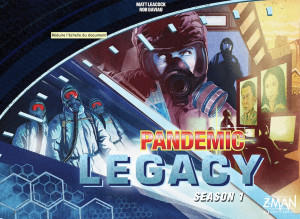 Note: This is a spoiler free review of Pandemic: Legacy. Any information discussed here is found in the rulebook or pages loose in the box when opened.
Note: This is a spoiler free review of Pandemic: Legacy. Any information discussed here is found in the rulebook or pages loose in the box when opened.
When it comes to original board games on the market today, you’d be hard pressed to find an experience more unique than a Legacy game. Published in 2011, Risk: Legacy turned tabletop gaming on its head by bringing a game to the market that players physically altered over time. Players wrote on, ripped up, and otherwise defaced their game during play, and they loved it. Who would have thought!
Since then, gamers have been chomping at the bit for the next legacy game to tickle our imaginations. Well fret no more because Risk: Legacy designer Rob Daviau has teamed up with Matt Leacock, the designer of the perennial best seller Pandemic (review here). What these two industry veterans have brought us is Pandemic: Legacy. A game played over twelve months where players must fight off the infections plaguing humanity. Can you save a world that will literally never be the same. Lets find out!
Pandemic: Legacy is a cooperative, campaign style game for 2-4 players that takes about 45-60 minutes to play. Pandemic: Legacy plays well with any number of players.
Game Overview:
In Pandemic, 2-4 players must work together to save the world from 4 different diseases. During the game, players will be traveling around the world, treating diseases, sharing knowledge, and trying to discover the cures before the plagues overtake the world.
In Pandemic: Legacy, this formula is added to a campaign style game play where decisions players make in previous games will affect all games going forward. Expect to be destroying cards, applying stickers, making new discoveries, and opening secret packages. How players win the game will change from month to month, so players must be flexible if they hope to save humanity.
Game Components:
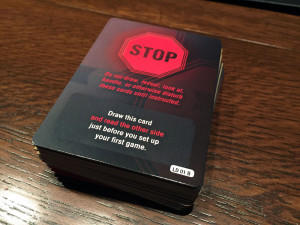
Pandemic: Legacy has a number of components, both open and secret, included when you open the box. People who have experienced Pandemic before will find the familiar game board, infection cards, pawns, and player cards. There are plastic cubes for the diseases, pawns for the players, and plastic research stations. All-in-all, functional, but honestly nothing to write home about.
Where things get interesting are the Legacy components. The game contains a legacy deck that will guide you through the game’s 12 month cycle. These cards instruct a player to make changes in the rules and also when to open the games hidden compartments. These come in the form of both 8 sealed boxes and also a “top secret dossier” that has 50+ compartments to open. This kind of reminded me of an advent calendar that I opened growing up. The game also comes with a large open (read: not secret) sheet of stickers that will be applied to the game at various stages.
How to Play:
I’m mostly going to talk about how to play the base game of Pandemic: Legacy. Any changes due to the legacy deck will have to be experienced for yourself. If you’d like a more in-depth explanation of how to play Pandemic, check out our previous review of the base game.
Before you start the game, check the top card of the Legacy deck for any special rules for this month’s game. Many cards in the deck have a giant stop sign to indicate when players should stop drawing cards and also when to start drawing again.
The game begins with 9 cities already infected with one of the four diseases. Each player assumes a unique role (Medic, Scientist, Researcher, Generalist or Dispatcher). These roles are largely the same as found in Pandemic.
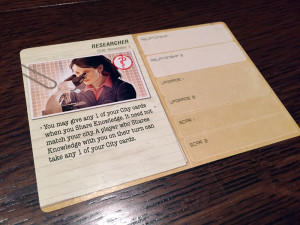
Players take turns in a clockwise manner and each turn consists of the following 3 phases:
1. Take 4 Actions: The familiar actions consist of move, treat diseases, build a research station, cure a disease, or share knowledge. Actions can be repeated if desired.
2. Draw 2 Cards: Draw cards from the player deck and add them to your face up hand. If a player draws an epidemic card, a few extra steps are required:
- Draw the bottom card of the infection deck and add 3 cubes to that city.
- Shuffle the infection discard pile.
- Place it on top the infection deck.
3. Infect cities: Draw a number of cards from the infection deck equal to the infection rate (starts at 2). Add one cube to each city. If a city already has 3 cubes, an outbreak occurs and each adjacent city gains one cube. Chain reactions may occur as a result.
Then the next player takes their turn. The game continues in this fashion until all 4 diseases have been cured or the players have lost due to: too many outbreaks, running out of cubes to place on the board, or drawing the last card from the player draw pile.
After the game, the Legacy deck will instruct you of how to proceed. This may entail drawing more cards, opening doors or boxes, or altering the game in some state. Win or lose, players also gain 2 upgrades to permanently alter their game.
Out of the box, the large sticker sheet has a variety of upgrades to aid players in their future games of Pandemic: Legacy. Once you’ve chosen your upgrades, you are ready for your next game. If you won the previous month, you move on to the next one. If you lost, you have one more chance to try to beat that month before the game moves you on to the next one.
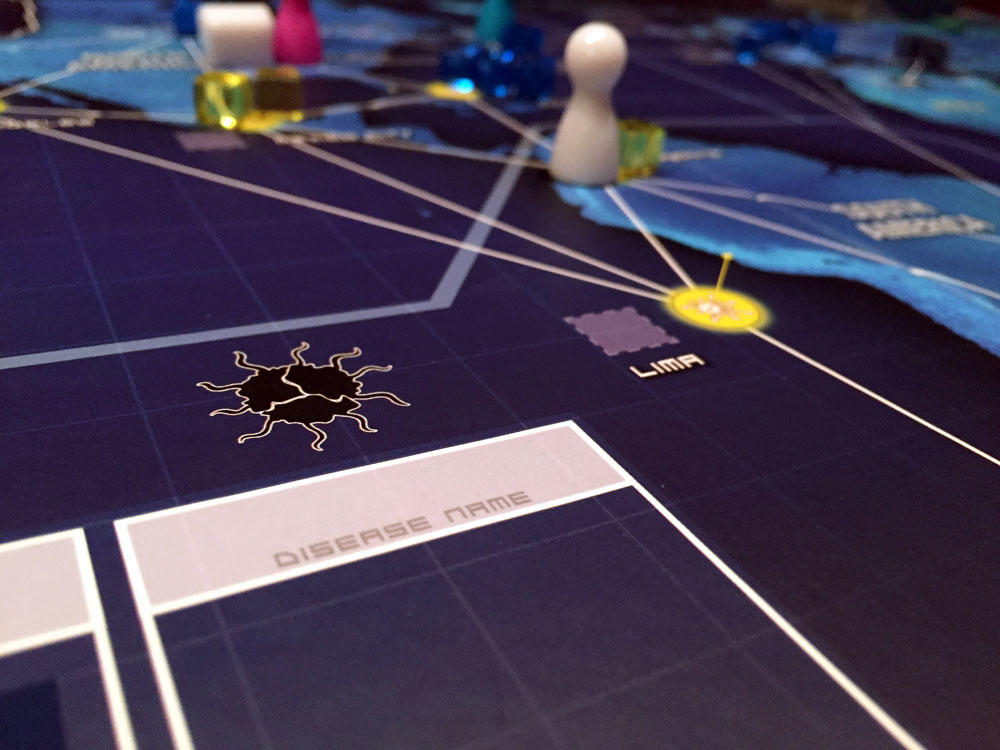
Game Experience:
I think no game I’ve ever reviewed has been more fitting to have it’s “game experience” be talked about than Pandemic: Legacy. That’s because the game is really an experience unlike any other. It’s not really one game that’s remarkable, but the experience of playing it over the course of the 12 months.
I know there are people out there who hate the legacy system because you are essentially putting an end on how long you can use a game. And I get that, but I think if you are denying yourself the opportunity to play Pandemic: Legacy because of its consumable nature, then you are doing yourself a great disservice.

Why? Because Pandemic: Legacy is both incredibly fun and very unique. The game itself is as solid in design as Pandemic (which is awesome) is. I don’t need to go into all the ways that Pandemic is great, you can read our review on that one if you want that. So lets talk about why Pandemic: Legacy is so great.
What really draws me into the game is just how unique of an experience is. I own many board games (my wife would probably tell you too many). With that, I probably have a lot of games that play similar to others. Worker placement? Dice Games? “Dudes on a map”? I’ve got countless of all those. But when it comes to the game experience that Pandemic: Legacy provides, it really does sit in a class all by itself.
It takes a winning concept and rolls it up into a campaign style game where your decisions really do matter. The cards in the legacy deck have a lot of “If then” type of statements. If this happens, then open this box. Which in turn, leads you to more new concepts. The game evolves as you play. The way you play “January” Pandemic: Legacy will be much different than “June” Pandemic: Legacy. And as someone who is playing two different copies of the game with two different groups, I have already seen both games going off in different directions.

And honestly, it’s those doors and boxes that absolutely have you coming back for more. Much like with the afore-mentioned advent calendars, there is something addictive about opening those doors and boxes for the first time. What’s going to be inside? Is it good or bad? (hint: it will be both). But there is something inherently cool about making the game your own. As someone who likes to keep their games in mint condition, tearing up the cards gives me a bit of anxiety. However, I’ll freely admit that writing on the board is fun. The rulebook says if that if you can eradicate a disease during the game, you can name it. We tried to think of something we hate with a passion to name one of our diseases… so naturally we named it Comcast. 🙂
Moving on, while Pandemic: Legacy does create a whole unique gaming experience, it is still Pandemic at it’s heart. So if you absolutely hated Pandemic, even the legacy style will probably not change your mind. The game is still a fully cooperative game and there can still be an issue with “quarterbacking”. If those are deal breakers for you, then you are probably better served looking elsewhere.
However if you are a Pandemic fan, then this game will be an addictive gaming experience for you. Outside of Risk: Legacy, you’ve really never played something like this and it’s awesome. In fact, I had to resist the urge to completely play through the entire season of Pandemic: Legacy in one sitting. We played 4 consecutive games the first time we opened the box and I still had to pull myself away from the game. If a game can have that kind of draw, especially one based off something that was published almost a decade ago, you know they are doing something special.
Final Thoughts:
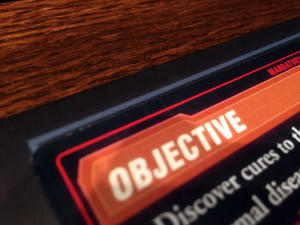
In case you can tell so far, I absolutely LOVED Pandemic: Legacy. Not whole surprising because I was a fan of both Pandemic and Risk: Legacy. This marriage of these two games has created something so unique, that I can honestly say I don’t own any games that could replace it. I think the theme is also perfect for a legacy style game.
If you are someone who is avoiding this game because of its consumable nature, I say to give it a try anyway. Pandemic: Legacy is played over 12 months (which each month being able to be done two times if you fail the first) and I’d expect the average group to get about 18 or so plays before they reach the end of the campaign. That’s a lot of value for your entertainment dollar. It comes to about $4 a game (or $1 if you split the cost among 3 other people you are going to play it with).
I do think Pandemic: Legacy plays best if you go with the same group of people the whole time. That is not to say you can’t add in people along the way. In fact, Pandemic: Legacy can play just fine as “vanilla” Pandemic. The game even suggest a few games of normal Pandemic if you are a newbie.
Designers Matt Leacock and Rob Daviau really hit this one out of the park. They created a game that I found myself constantly itching to get back to the table when I’m not playing. It built on some solid mechanics, clearly well playtested, and provides a wholly unique gaming experience that you are unlikely to replicate on your tabletop. Absolutely pick this one up today. And don’t be surprised if you see Pandemic: Legacy in the running for our Game of the Year awards in the spring.
If you’d like to pick up a copy of Pandemic: Legacy, you can get it for about $50.
Final Score: 5 Stars – A wholly unique and highly entertaining game. Even if it has an end point, it’s worth getting for the awesome gaming experience.
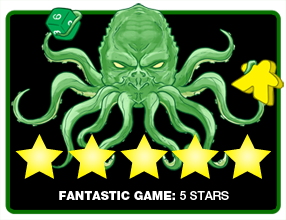 Hits:
Hits:
• A really unique gaming experience
• Rock solid mechanics
• Addictive game play and campaign
• Game scales its difficulty based on your successes and failures
Misses:
• Doesn’t solve Pandemic’s tendency for “quarterbacking”
• Hard to resist the urge to play games constantly.




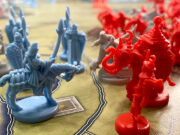


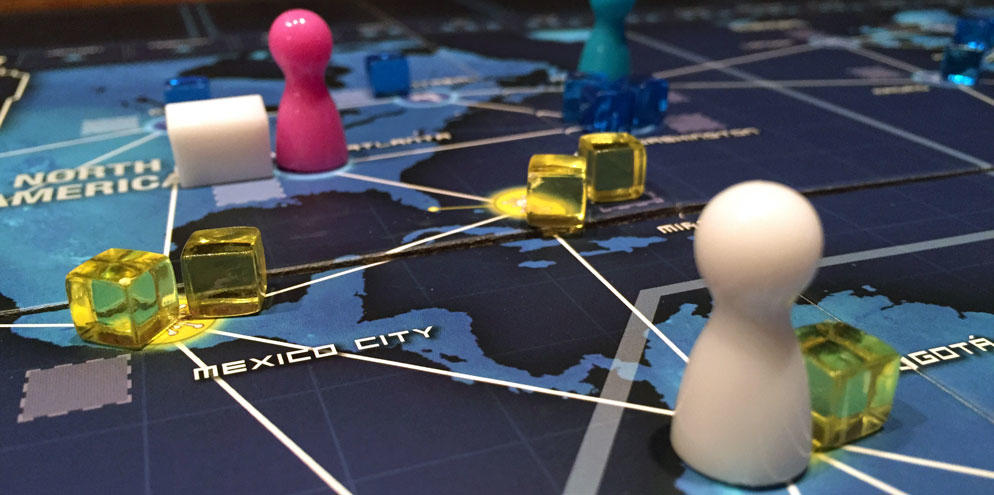















how easy is it to play this game like normal pandemic?
I would like to get this game to get some players into boardgaming and if succesfull get them to join us in a long campaign playing the legacy version. However I do not want to first get a normal version of pandemic as well.
Very easy. In fact, the rulebook even says that if you are not familiar with Pandemic, you should play a few normal games before you start with the legacy deck. I don’t see any reason why you’d have to buy the other version of Pandemic first.
That’s great to hear, Will get this coming holiday season.
Btw, is it also possible to use the boardgame as a standard pandemic game once you’re finished with it? Would love to be able to get people into the hobby with this game as well if needed.
So what happens when the year is ove? Do I just throw away the whole game? $4 a game isn’t bad but considering I can play regular pandemic x Infinity that’s not a strong selling point.
You should check out our recent article on Board Game Innovation: http://www.boardgamegrow.com/board-game-innovation/
Sometimes a game is not about the replay value x $. It’s about the absolutely unique experience it offers.
Nice article, and one that reinforces my thought that this would make a great game for myself and new-to-the-hobby SO. One question though, I’ve read that when playing with two, each player controlling two characters – so 4 in total – works. Would you recommend this, or just stick with 2 characters as a two-player game?
I played the game with my wife and we only controlled one character each. We both had a ton of fun and never really felt the need to control two characters each. It might be slightly easier with only 2 characters vs 4, but I never really like having to control more than one character.
Hi Tony, thanks for your reply. My preference is one character each, my SO is still new to gaming so juggling more than one might distract from her enjoyment of the game. And while I’m a very experienced gamer, I’ve only played Pandemic a couple of times — not really a fan of co-ops — but really looking forward to seeing how the Legacy game plays out.
After playing the campaign, can I still use the boradgame to play the regular pandemic?
For the most part, I’d say yes. You can always ignore stickers on the board and on cards. You’d just have to make sure you don’t permanently destroy anything you might need to play regular pandemic.
I am quite angry on how this game is designed. I spent a lot of money for just a one time game. I will not be buying anymore of your products.
Except it’s a minimum of a 12 time game for 12 months, but sure keep trolling.
I have read loads of reviews of Pandemic Legacy, all good. We are playing it 4 player and are at the end of July having played 9 games in all so far + 3 games of normal Pandemic we played with the set first so we knew the normal rules.
I have to say that it has yet to draw me in. I see the other 3 players getting into it, tense, excited and exhilarated and I honestly wonder what I’m doing wrong? Here’s why.
If you lose a month, you play it again except you get a bit of help.
If you lose 4 months on the trot then . . . well I don’t know what happens but there is some sort of special contingency rules for this eventuality. We’ve only lost 2 games and they were not one after the other.
It’s non-competitive – no one wins or you all do.
It causes arguments because of the team driven nature.
I recognise that it is supremely well designed but I find it extremely boring.
Summary : It’s very cleverly written and designed, but it’s not fun.
That’s OK. You are allowed to not like it. Not every game is for everybody.